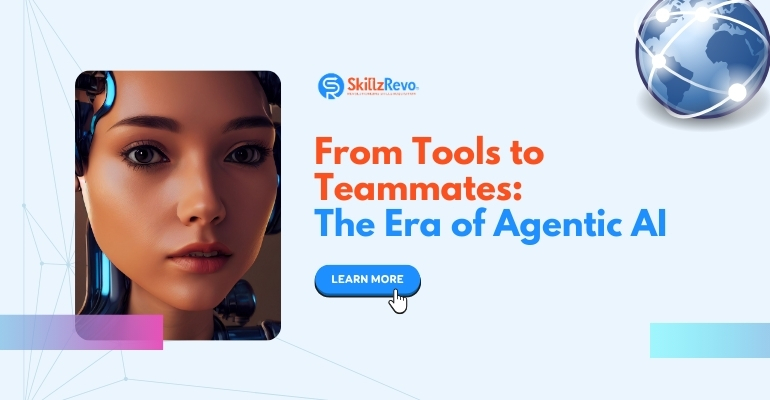From Tools to Teammates: The Era of Agentic AI
From Tools to Teammates: The Era of Agentic AI
Artificial Intelligence has progressed a long way—from obeying the commands to working alongside the operators through thinking, planning, and decision-making. This is a new type of AI called Agentic AI.
It is no longer just about automation, it is about collaboration. Let’s take a closer look at the real meaning of Agentic AI, how it is being applied in practical application, and why it matters.
🔍 What is Agentic AI?
Agentic AI denotes AI with a sense of agency—hence, those AI with the capacity to:
- Establish goals or get a missions
- I’d also suggest breaking up the task.
- Make the next move without human assistance
- Adjust based on reaction forts of the fence get Context, portions of the fence.
Think of it as an A.I. servant that doesn’t just follow orders — it figures stuff out and takes the initiative.
🛠️ From Tools to Teammates: What’s the Difference?
| Traditional AI | Agentic AI |
| Follows direct instructions | Plans and acts independently |
| Needs constant input | Works on long-term goals |
| Task-specific (e.g., translate text) | Multi-step and goal-oriented (e.g., create a report, send an email, update the database) |
| Passive tool | Proactive partner |
🌍 Real-World Examples of Agentic AI in Action
Let’s break it down into real use cases across industries:
1. Healthcare: A 24/7 AI Assistant for Doctors
- Old Way: Doctors review patient records, monitor vitals, and manually flag issues.
- Agentic AI: Monitors real-time patient data, identifies risk of stroke or heart failure, and alerts doctors before the issue escalates. It can also suggest medication changes based on the patient’s history.
2. Pharmacy & Drug Management
- Tracks medicine stock, predicts demand based on seasonal illnesses, and reorders automatically.
- Can answer patient questions via an AI chatbot and send reminders for refills.
3. Software Development
- Tools like Devin (by Cognition AI) act like an autonomous software engineer. You can give it a project brief, and it will write code, test it, debug it, and even deploy it.
4. Business & Office Automation
- AI agents can take your meeting notes, summarize them, assign tasks, follow up with reminders, and even send emails—without you lifting a finger.
5. Education
- AI tutors personalize learning for students, adjusting content based on strengths and weaknesses.
- Can create lesson plans, quizzes, and even simulate one-on-one tutoring sessions.
6. Personal Use
- AI agents can manage your calendar, plan trips, suggest meals based on what’s in your fridge, or help you stick to a fitness routine.
🚀 Why Is This a Big Deal?
- Increases Efficiency: Saves hours of work by handling repetitive or complex tasks.
- Works Autonomously: Doesn’t wait for instructions—it thinks and acts.
- Scalable Help: You could have multiple AI agents working in the background while you focus on creative or strategic tasks.
- Makes You Smarter: Helps you make better decisions with summarized insights and suggestions.
⚠️ Challenges to Consider
- Trust and Safety: Can we trust the decisions the AI makes?
- Control: How do we stop or correct it if it goes off track?
- Ethics: Should AI be allowed to make certain types of decisions?
- Accountability: If something goes wrong, who is responsible?
These are major questions, especially in fields like healthcare, law, and finance, where mistakes can have serious consequences.
💡 Conclusion: Welcome to the Agentic Era
We are entering an era in which AI is not just a digital assistant; it’s a collaborator. Agentic AI is no longer the stuff of science fiction. It is already quietly at work in many corners of our lives and workplaces.
Instead of “What can AI do for me? we’ll begin to ask ” What can we make together?”







